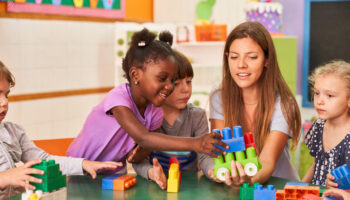Erin DelRegno Evans
“Play is often talked about as if it were a relief from serious learning. But for children play is serious learning. Play is really the work of childhood.” Fred Rogers
Who doesn’t remember playing when they were young? Coming up with your own games, playing outside almost every day whether sunny, snowy, or rainy. We were free to explore, try new things, make our own decisions, and it wasn’t directed by our parents. Sadly, children don’t have as much freedom to play as we once did.
There are many reasons we don’t see as much free play as we used to: busy schedules, a high concern for safety and risk, time spent in extracurricular activities, increased use of technology, focus on academic readiness, adults directing children’s play activities, etc. Is limiting play, or being in control of what they do during play, helping our children though? Let’s start by answering some questions you may have about play.
Why is play important?
Play is how children explore and learn, develop new skills, and connect with others. Self-directed play allows children to engage and interact with the world around them, use their creativity, develop their imagination, and use their critical thinking skills. It allows them to learn how things work and builds their independence.
Play allows children to take risks and explore the unknown. This may sound scary to you, but it is an important part of play and growing up. When they can freely explore and make mistakes, they will learn from those experiences. They will persist and problem solve to figure out how to do it differently next time. This helps them to build confidence and resiliency for when they face challenges.
Play allows children to learn how to interact with others. As they play with their peers and adults, they will learn how to see things from another person’s point of view, how to work together, share, negotiate, and resolve conflicts. Play is important for children of all ages (including adults) and gives them the opportunities to grow. Please refer to the resource links at the bottom of this article; they include even more information on the benefits and importance of play.
Are they learning, or are they just playing?
As program quality assessors we look at classroom schedules, and many times “learning time” is written as a specific time of the day. Learning happens all day long, so thinking that learning only happens during planned, teacher-led activities because that is what the schedule says means you are probably missing so many teachable moments with your children. We also hear some teachers say that they don’t just let the children play all the time and that they have learning time as well. Well, I may have a surprise for everyone… play is learning. It’s not one or the other; they are one and the same. Here is another big surprise to share… play is how young children learn best! This is what research shows us.
The great thing about play is it integrates all domains of children’s development at the same time. It doesn’t only focus on one area, but naturally allows children to develop social, emotional, physical, cognitive, language, and creative skills, and each of these areas is just as important as the other. If you use play intentionally, it will help them to not only develop strong academic abilities but will assist them in developing the skills they need for work and for life.
Albert Einstein said, “Play is the highest form of research.” Children, and adults, learn by doing, and any concepts you discuss should be reinforced during play. When children are actively involved and engaged and are experiencing a concept more concretely, it makes it more meaningful to them and helps them to fully understand. Think about the skills you still use today and how you learned them… did you learn them just by listening to someone talk and answering questions about it, or did you learn with hands-on experiences?
But will they be ready for kindergarten?
If you work in Early Childhood Education (birth – 8 years), your expectations for those children should be developmentally appropriate. Some people believe that teaching children academic skills as early as possible is the way to get them ready for school. However, rote learning (e.g., worksheets, flash cards, etc.) in early childhood settings does not influence how well children will do in school.
Merriam Webster dictionary defines “rote” learning as the use of memory usually with little intelligence, and as mechanical or unthinking routine or repetition. Sitting and listening may help them memorize and be able to recall an answer (short-term), but they aren’t learning to question or explore. If you want children to truly learn and understand what something means, and the reason for learning it, you need to allow them to practice and use their thinking skills during play.
If you want to get them ready for kindergarten, do what is developmentally appropriate for the age group you are working with. If you focus around play and not just academics, they will develop all the needed skills. During play, they are busy, focused, and enthusiastic in what they are doing and learning. If you want true outcomes and real learning, incorporate more play, not less.
The most important thing to remember is that we need to start where children are and work from there. They don’t all come into our early childhood classroom, or into kindergarten classrooms, at the same place and there is nothing wrong with where they are. Think about infants…. they all sit up, take first steps, and say first words, but they each do this at their own time. Learning is a process, and you can’t drill them into being where you want them to be. We know all children learn differently, and play allows children to learn in their own, varied ways.
Play matters and is necessary for children!
Children are naturally curious and want to learn, so as teachers, we should nurture their love of learning. Research continues to show that young children learn best through meaningful play experiences, yet we seem to disregard the value of free play when working with children. Children need to be interested in order to learn, so why not make learning fun? Make sure to provide them with the needed time, space, and a variety of open-ended materials and see where they go from there. Yes, it will be unpredictable, noisy, and messy – Embrace it! It’s all a part of learning.
“I hear and I forget. I see and I remember. I do and I understand.” – Confucius
Resources:
The Importance of Play (video)
TeachersSpeakOut – How Play is Learning (video)
The Benefits of Play for a Child’s Development
The Genius of Play – 6 Benefits of Play
NAEYC Articles about Play
What’s the Deal with Rote Practice?
Stay tuned for part 2 and 3 of Let them PLAY. Part 2 will go more in depth about what free play looks like and the importance of child-directed play, and Part 3 looks at the adult’s role during play.




